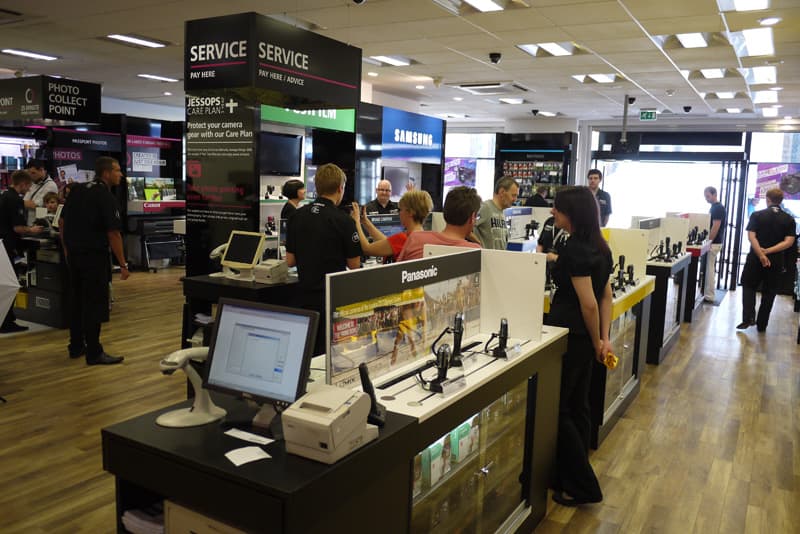‘Business has been absolutely bubbling,’ says Tony Stent, director of CameraWorld which operates stores in central London and Chelmsford, Essex.
‘First it was Jacobs and then, the bigger, Jessops effect.’
Stent believes there is ‘definitely a future’ for specialist high-street photo retailers, but points out that the full impact of Jessops’ disappearance won’t be felt for some time.
‘It’s early days,’ he tells AP, reluctant to speculate on how much his stores stand to gain.
‘It’s good and bad news,’ adds Reg Atkins, managing director of Park Cameras, a 42-year-old business based in Burgess Hill, West Sussex.
He told Amateur Photographer (AP): ‘I feel for the [Jessops] staff. And consumer confidence is going to take a knock – paying with any gift vouchers is going to be hit after what has happened at Jessops and HMV.’
Yet, like Stent, Atkins is upbeat. He estimates that hundreds of camera shops could pick up business worth tens of millions of pounds in the wake of Jessops’ high-street exit.
Though the likes of Argos and Tesco may gain from sales of cheaper cameras, Atkins sees independents as the places to go for models costing above £200.
This is an area, he says, where training and advice delivered by stores such as Park Cameras will be key to pulling in business from the photo enthusiast.
‘My hope is that these gaps, will gradually, naturally, be filled,’ adds Stent who does not rule out new stores appearing where, following Jessops closure, there will be ‘voids’ to fill.
Risks for newcomers
However, it seems that, for any newcomer without experience in the industry, operating on the high street could prove risky in today’s economic climate.
‘There are not enough [profit] margins for people coming into the business… to wheel and deal and sell a diverse range of products,’ warns Stent.
As for Jessops’ demise, it did not come as a shock.
Atkins, says he foresaw the chain’s imminent downfall, given that the rent and VAT were due to be paid around this time of year, and that Jessops’ stock appeared to be low.
Atkins says that when he visited a Jessops branch in Taunton on 3 January there was no DSLR priced over £400 in stock.
‘Jessops had fewer brands in stock and were not really showing customers the full range of products,’ he tells AP.
A camera chain may no longer be a viable option, but it seems this is no time for other camera stores to rest on their laurels.
Stent stresses the importance of independents keeping down their costs, while continuing to focus on providing expert-level service and stocking a range of products.
Online threat
While, Atkins says independent retailers can emerge as winners from the situation, he calls on the government to prevent some of the online – UK registered – retailers from sourcing cheap cameras from the ‘US and the Far East’ – and undercutting high-street shops by advertising prices excluding VAT.
He points out that this means models are being quoted online at ‘below cost price’ – a figure high-street shops find difficult to compete against.
‘That’s the principal reason Jessops went under. They tried to match these prices,’ says Atkins – a view echoed by CameraWorld.
‘There came a time for the [Jessops’] bank to say “enough’s enough”,’ continues Stent, who cites Jessops’ shift away from products aimed at the photo enthusiast – towards ‘gadgets’ – as another key reason for its collapse.
‘It moved away from being a proper hobby shop.’
Is there a fear that the likes of Canon and Nikon may, one day, bypass the retailer altogether and sell direct to customers?
Yesterday, an unfounded industry rumour that Canon was poised to buy 50 Jessops stores was swiftly shot down by administrator, PwC, when approached by AP.
In any case, Stent believes that such a business model, where the consumer is faced with only one brand on show, would not work in a market where photographers like to compare products from different manufacturers.
Though Atkins believes there are 50-60 Jessops stores that could turn a profit, camera makers would fail to benefit from taking over a store in a prime location, where they would be faced with high rent, for example – unless they were ‘massively subsidised’.
‘Some of these stores are too big to justify [selling] a single brand,’ he explains.
Atkins says that even if manufacturers consider selling direct to
customers from their own stores – ‘if it gets to the point
where they cannot see themselves getting enough sales through existing
outlets’ – he believes this would not be a valid business proposition given the profit margins on camera kit alone, where such a store would require a ‘turnover of £5m to break even’.
Meanwhile, Atkins calls on manufacturers to support the independents by not setting unrealistic, ‘inflated’, sales targets in the wake of Jessops’ disappearance.
He also wants to see more camera brands supporting independent shops, by providing ‘in-store demonstrators’.
And Park Cameras hopes suppliers will, in future, offer shops higher discounts on demonstration models when they expect stores to stock cameras that are launched in a wide range of colours.
- Canon and Nikon have refused to say how much Jessops owed them when its 187 stores ceased trading last Friday – neither firm was willing to comment. Unofficial estimates run into several millions, with Canon the more heavily hit of the two, according to an industry insider. According to administrator PwC, stock will be returned to suppliers, if they are entitled to it.







